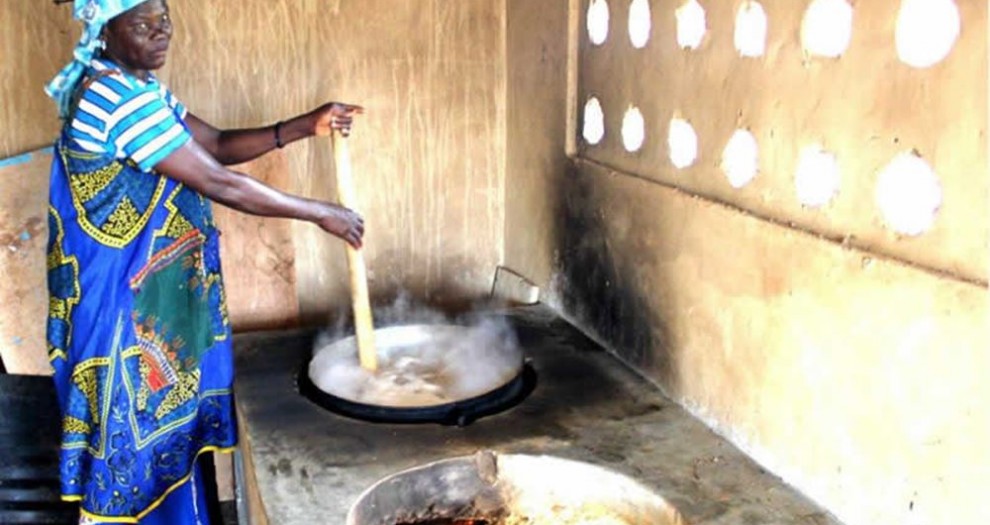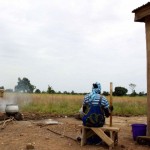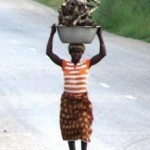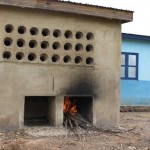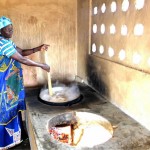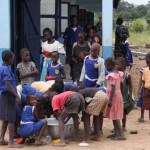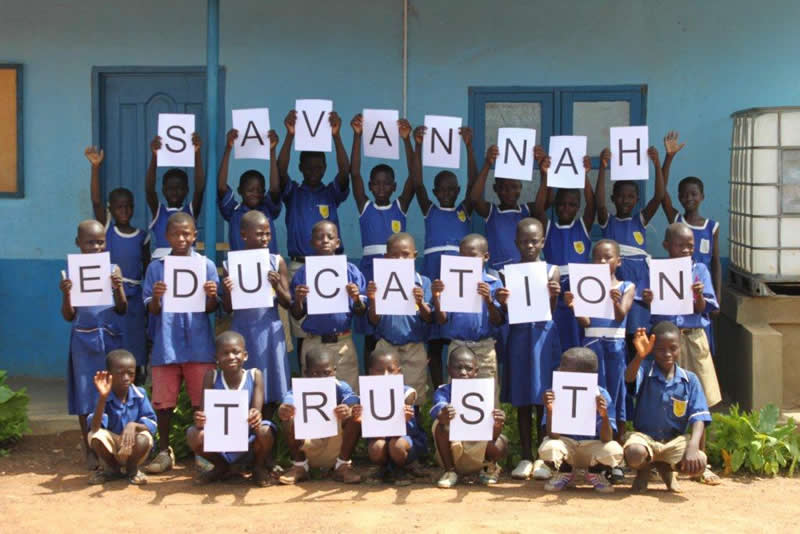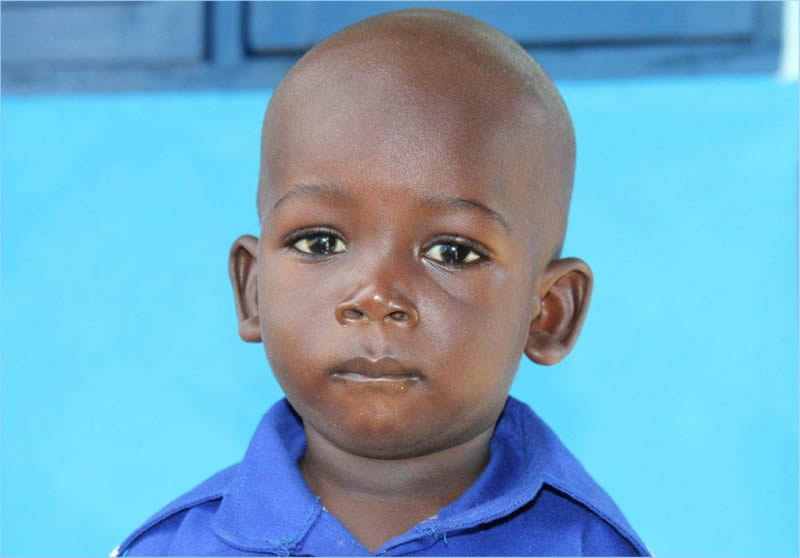Welcome to the online version of our Autumn 2013 Newsletter. In this newsletter:
Kitchens Constructed
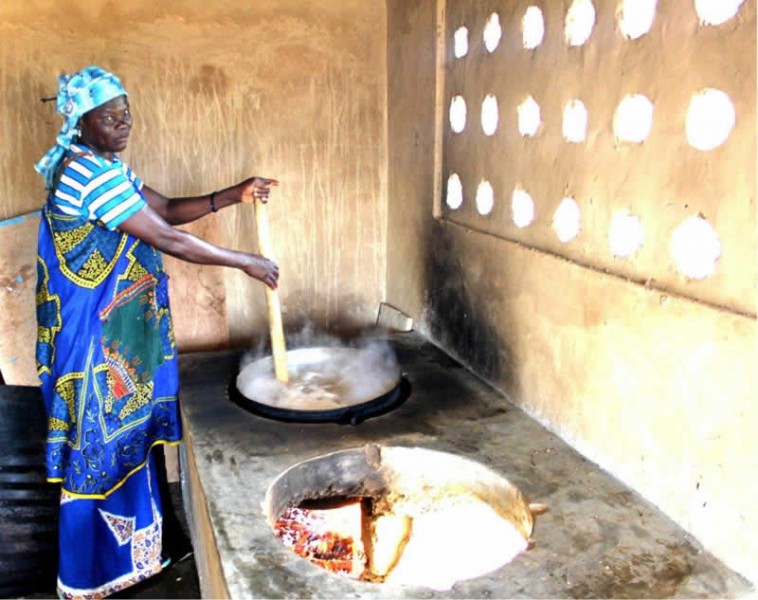
The meal that we provide for each child, each day, is an important part of our work. But up until recently not all of our schools had a kitchen or dedicated cooking area. This is a part of the world where children often go to bed hungry. During the long, dry season when there is little food, children can be found in the bush looking for small animals to eat – just to supplement what little their parents are able to provide.
And so at each of our schools a simple meal is provided each day. This means that no child is too hungry to learn. It also helps the parents and encourages them to send their children to school rather than helping them on the farm.
Local villagers are employed to act as cooks. During the dry season they are happy to cook outside, using huge cauldrons over an open fire – but when the torrential rain arrives (between May and September) an enclosed kitchen area is necessary. This also allows the cooks to lock the dry food away securely, and it is sad to report that in June we had our first theft of food. A dedicated kitchen also provides a safer way of cooking – meaning that there is not a fire in close proximity to the younger children.
Our first school at Bagri already had a kitchen area, and a kitchen has been constructed as part of the building work at our latest school in Mettoh. But at the end of June both the schools in Gberi and Pavuu completed building work on new kitchens – to the delight of the villagers, the cooks and the pupils.
How does a kitchen function without a cooker?
The small room contains concrete boxes topped by holes on which large cauldrons sit. The kitchen also doubles up as a wood store, and the wood is fed into the fire from the exterior of the small building. For the cooks, working all morning alongside the smoky fire, it is all very hot work …
As can be imagined the task of providing a meal each day for nearly 1,000 pupils across four different sites is quite a logistic challenge. The construction of kitchen buildings makes it easier.
Week by week, the cooks collect the wood from the nearby countryside. Indeed if you are enjoying the beauties of dawn in this part of the world, you will often see women (and it is invariably women) returning from a trip to collect fire wood. Through the early light breaking across the savannah, they walk with staggeringly heavy loads – and all carefully balanced on their head.
How Sustainable Is It All?
The question is expressed in different ways. But it essentially boils down to the same point – as the work continues to expand, is it sustainable? Are we in danger of overreaching ourselves? It is an important question that our supporters are right to ask.
The first – and crucial – point to make is that the cost of the teaching staff at our schools is covered by the local government. That means that if the charity was unable to provide a single penny more of funding, the schools would continue to exist, albeit without the important programmes of support (including feeding for pupils, training for teachers and repair of buildings) that help to make these happy and effective schools.
Secondly, as supporters will remember from the last newsletter and our public talks, we are very reliant on direct debit contributions from our supporters. These regular contributions – of whatever size – are invaluable because they help us to plan for future cost of the programmes that support the schools. We are thankful that the last two schools that have been built have been funded through gifts given specifically for that purpose. This has allowed us to continue to devote the funds that we receive from direct debit contributions to the ongoing costs of the programmes.
Thirdly, we are conscious that, whether direct debits or other forms of income, we are entirely dependent on the Lord’s goodness in providing funding, and we have been continually surprised and thankful by the ways in which the charity’s needs have been supplied.
We do not feel as though our work is complete when children in neighbouring villages are suffering greatly – and when we are in a position to help. We are continually aware of the significant needs of these children and are aware that there is nobody else to help. But we do not undertake expanding the work into new villages lightly or without careful thought – and also careful consideration of future costs.
A New Academic Year
With the building at Mettoh complete, the first pupils started in September. For the first time in its long history, the village of Mettoh will have a school – and pupils enjoying an education.
Of course, the numbers in the other schools will also swell. During the last academic year, we worked hard with our colleagues in Ghana to get robust statistics – so that we now have precise numbers of girls and boys in each class, with some information on their background and attendance records. Bagri remains our largest school with over 400 pupils.
The start of the school year is one of the most challenging for our families. It is the end of the intense farming season, culminating in the harvest and celebrations in October called ‘Kobine’. To send children to school during this time – when every pair of hands (however young the child) is needed in the fields – is a real sacrifice. It is a testament to the importance of the feeding programme, and the value placed on education by parents, that the schools are not empty at the start of the school year.
Legacy Income
We have been particularly touched to receive a number of legacies over the past few years – mostly unexpected and a significant provision for the ongoing work, often arriving at extremely timely moments. These legacy gifts especially help us with the expensive building projects that are often difficult to fund from the regular, month by month donations.
We would like to thank all of our kind supporters for their ongoing support of the work. We are extremely grateful.
The End of Term
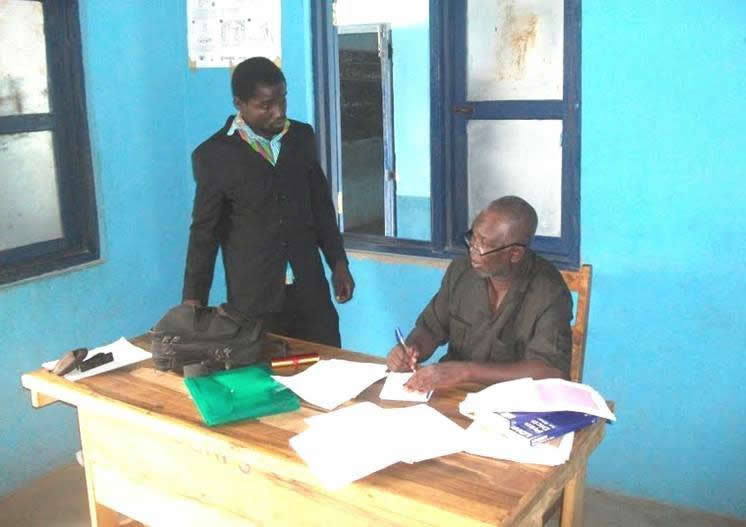
The end of the school year brings similar pressures and excitements to those in British schools. The last term of the year is exam term. None of our pupils is yet at the stage of taking the formal, national examinations which are set at the end of school (at the age of 14 in Ghana). But formal tests for pupils were held across all three of our existing schools.
The end of term was also an opportunity to award prizes for those who had performed particularly well throughout the year. In addition, presentations of books (a Bible and copy of Bible Doctrines Simply Explained) was presented to each child as they finished at primary school (currently only Bagri pupils have reached this stage). These children will start next year, based on the same site, at the Junior High School that we have now built for them. We are thankful that these children can now read for themselves, and also grateful that they have some books of their own, sent to them by kind friends from a chapel in the UK. We hope that at every school a similar presentation will be made to each child as they leave primary school.
For Gberi School, the last week of term also meant a formal inspection from the circuit supervisor. We are pleased to report that the Savannah schools continue to be held in high regard locally.
Click here to download the Savannah Autumn 2013 Newsletter in PDF format (approx. 3.5MB)

